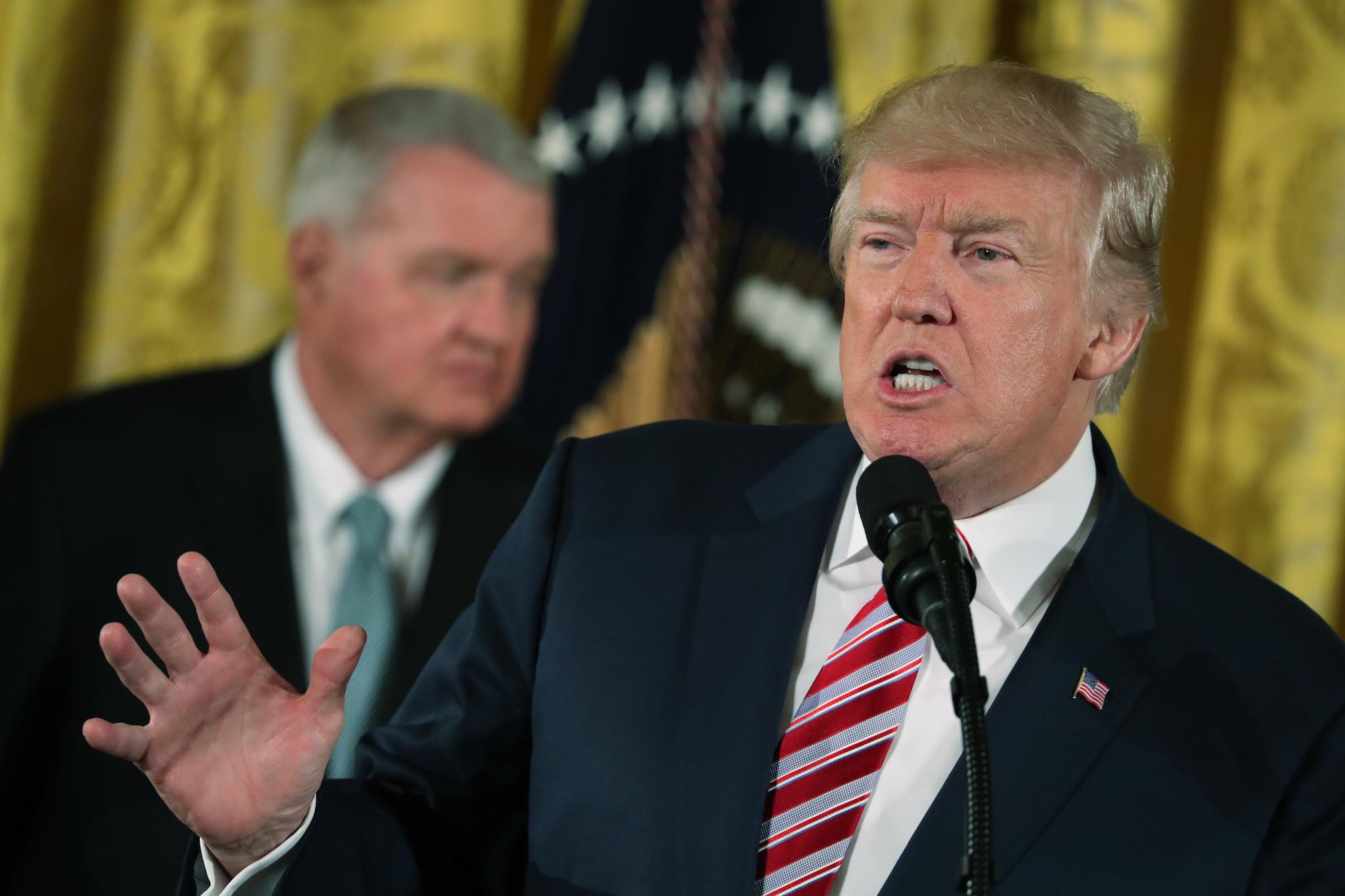Donald Trump's privatisation plans 'would hand America's most important assets to special interests'
Senate Minority Leader Charles Schumer asserted that financiers would profit while average citizens will be stuck with the bill for infrastructure projects

Your support helps us to tell the story
From reproductive rights to climate change to Big Tech, The Independent is on the ground when the story is developing. Whether it's investigating the financials of Elon Musk's pro-Trump PAC or producing our latest documentary, 'The A Word', which shines a light on the American women fighting for reproductive rights, we know how important it is to parse out the facts from the messaging.
At such a critical moment in US history, we need reporters on the ground. Your donation allows us to keep sending journalists to speak to both sides of the story.
The Independent is trusted by Americans across the entire political spectrum. And unlike many other quality news outlets, we choose not to lock Americans out of our reporting and analysis with paywalls. We believe quality journalism should be available to everyone, paid for by those who can afford it.
Your support makes all the difference.Donald Trump has announced his proposal to privatise the US's air traffic control system, part of his vision for a massive infrastructure overhaul that Democrats say could leave important assets in the hands of powerful corporations and special interest groups.
Senate Minority Leader Charles Schumer blasted Mr Trump’s infrastructure proposal, arguing that financiers would profit while average citizens will be stuck with the bill for projects aimed at trying to improve the nation’s waterways, roads and airports.
The administration's plan “means Trump tolls from one end of America to the other, and huge profits for financiers who, when they put up the money, want to be repaid by the average driver, worker and citizen,” Mr Schumer said.
Along with projects focused on rebuilding highways and waterways, Mr Trump wants to create a nonprofit corporation to take over the role of tracking and guiding airplanes, a task that is currently under the purview of the Federal Aviation Administration.
“Trump’s ideas for privatising air traffic control – which recycle a tired Republican plan that both sides of the aisle have rejected – would hand control of one of our nation’s most important assets to special interests and the big airlines,” said House Minority Leader Nancy Pelosi.
In the White House’s East Room on Monday, with airline company executives in attendance, Mr Trump said the proposal is taking “American air travel into the future”.
Calling the current system “ancient, broken, antiquated” and “horrible”, the President said his reforms would make it safer and more reliable. He also asserted that moving the system to a private non-profit corporation will help speed up the shift from using land-based radar to more precise GPS tools, allowing more direct routes to reduce costs and fuel consumption for airlines.
The FAA has been transitioning toward a GPS system for several years, but it's not scheduled to be fully implemented until at least 2020.
The President also slammed the Obama administration for investing money in an attempt to upgrade the system, an effort that “totally failed”, Mr Trump said.
“Honestly, they didn’t know what the hell they were doing,” he said. “A total waste of money”.
Mr Trump’s plan would need congressional approval, and both Republicans and Democrats in the past have expressed wariness about transferring the air traffic control duties from the government to a corporation.
Last year, a similar bill championed by Republican congressman Bill Shuster, chairman of the House Transportation Committee, never made it to a vote on the House floor. The White House used Mr Shuster’s bill as a guide to form its proposal.
While major airlines and the air traffic controllers' union are generally supportive of the proposal, certain trade groups – such as the National Business Aviation Association and the General Aviation Manufacturers Association – have said that private air traffic management would give big airline companies too much power and could threaten private aviation in smaller communities.
In a call with reporters, Mr Trump's chief economic adviser Gary Cohn asserted that “there is money to make sure that rural airports get protected”.
Democrats, preferring a much larger infusion of government money, have expressed scepticism over Mr Trump’s overall infrastructure plan for its heavy reliance on private funding.
Mr Trump has proposed to set aside $200 billion (£154 billion) over 10 years for infrastructure, which critics have said is not the big spending that Mr Trump promised during his campaign. According to the President’s budget request, the funds would be used to encourage companies, as well as state and local governments, to invest at least $800 billion in US infrastructure projects.
Calling it a “broken promise” of Mr Trump’s budget request, Democratic congressman Brendan Boyle asserted that the proposal falls short of the $1 trillion Mr Trump pledged during the campaign, one of his few promises that received support from Democrats.
Mr Schumer declared on the Senate floor that “President Trump’s campaign promises on infrastructure are crumbling faster than our roads and bridges.”
During a House budget committee hearing, the White House’s Budget Director Mick Mulvaney repeatedly emphasised that private capital investment is more effective and more accountable than government investment. But Mr Schumer says the White House’s focus on privatisation means “less construction and far fewer jobs, particularly in rural areas”.
Join our commenting forum
Join thought-provoking conversations, follow other Independent readers and see their replies
Comments